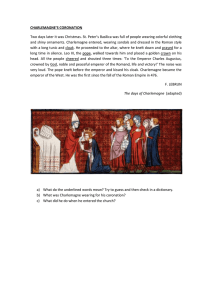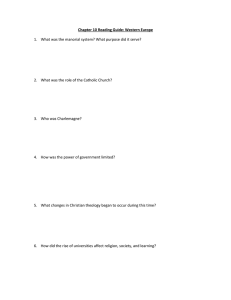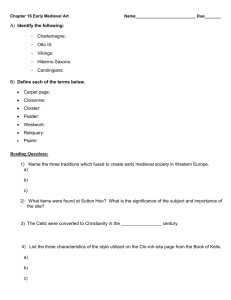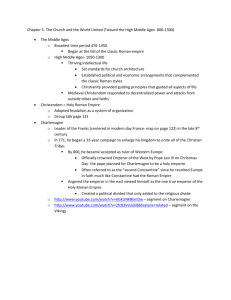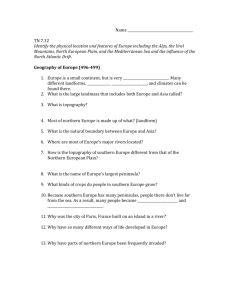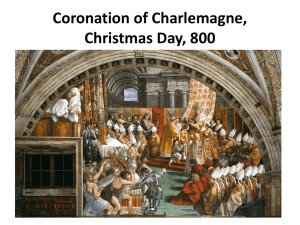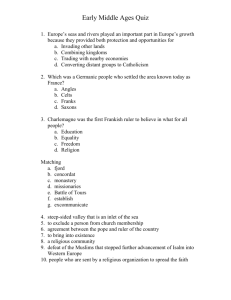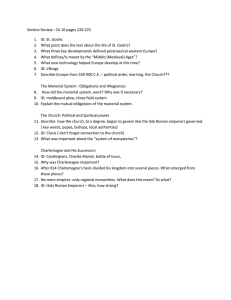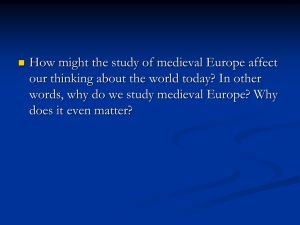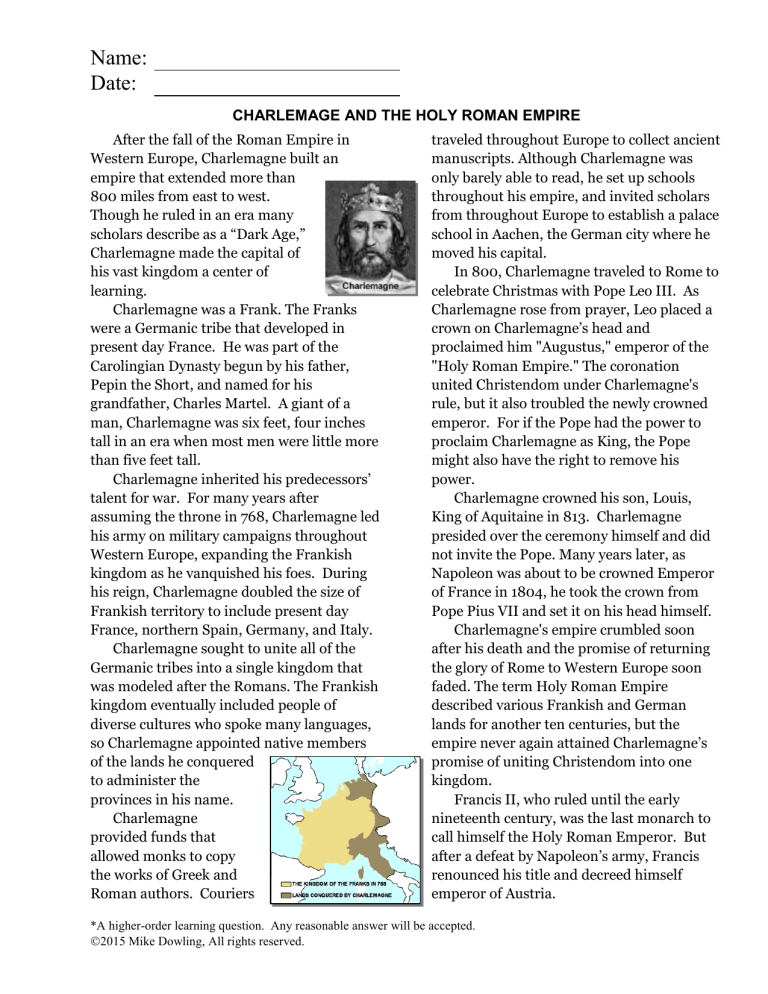
Name:
Date:
CHARLEMAGE AND THE HOLY ROMAN EMPIRE
After the fall of the Roman Empire in
Western Europe, Charlemagne built an
empire that extended more than
800 miles from east to west.
Though he ruled in an era many
scholars describe as a “Dark Age,”
Charlemagne made the capital of
his vast kingdom a center of
learning.
Charlemagne was a Frank. The Franks
were a Germanic tribe that developed in
present day France. He was part of the
Carolingian Dynasty begun by his father,
Pepin the Short, and named for his
grandfather, Charles Martel. A giant of a
man, Charlemagne was six feet, four inches
tall in an era when most men were little more
than five feet tall.
Charlemagne inherited his predecessors’
talent for war. For many years after
assuming the throne in 768, Charlemagne led
his army on military campaigns throughout
Western Europe, expanding the Frankish
kingdom as he vanquished his foes. During
his reign, Charlemagne doubled the size of
Frankish territory to include present day
France, northern Spain, Germany, and Italy.
Charlemagne sought to unite all of the
Germanic tribes into a single kingdom that
was modeled after the Romans. The Frankish
kingdom eventually included people of
diverse cultures who spoke many languages,
so Charlemagne appointed native members
of the lands he conquered
to administer the
provinces in his name.
Charlemagne
provided funds that
allowed monks to copy
the works of Greek and
Roman authors. Couriers
traveled throughout Europe to collect ancient
manuscripts. Although Charlemagne was
only barely able to read, he set up schools
throughout his empire, and invited scholars
from throughout Europe to establish a palace
school in Aachen, the German city where he
moved his capital.
In 800, Charlemagne traveled to Rome to
celebrate Christmas with Pope Leo III. As
Charlemagne rose from prayer, Leo placed a
crown on Charlemagne’s head and
proclaimed him "Augustus," emperor of the
"Holy Roman Empire." The coronation
united Christendom under Charlemagne's
rule, but it also troubled the newly crowned
emperor. For if the Pope had the power to
proclaim Charlemagne as King, the Pope
might also have the right to remove his
power.
Charlemagne crowned his son, Louis,
King of Aquitaine in 813. Charlemagne
presided over the ceremony himself and did
not invite the Pope. Many years later, as
Napoleon was about to be crowned Emperor
of France in 1804, he took the crown from
Pope Pius VII and set it on his head himself.
Charlemagne's empire crumbled soon
after his death and the promise of returning
the glory of Rome to Western Europe soon
faded. The term Holy Roman Empire
described various Frankish and German
lands for another ten centuries, but the
empire never again attained Charlemagne’s
promise of uniting Christendom into one
kingdom.
Francis II, who ruled until the early
nineteenth century, was the last monarch to
call himself the Holy Roman Emperor. But
after a defeat by Napoleon’s army, Francis
renounced his title and decreed himself
emperor of Austria.
*A higher-order learning question. Any reasonable answer will be accepted.
2015 Mike Dowling, All rights reserved.
Name:
Date:
Fill in the Blanks
Charlemagne was the greatest ruler of a *F__a__k__sh kingdom that emerged in W__s__e__n
Europe after the fall of the R__m__n Empire. By his death in 814, Charlemagne *d__u__l__d the
size of the kingdom he inherited from his father, P__p__n the S__o__t.
C__a__l__m__g__e’s army captured land in present-day S__a__n, Germany, and I__a__y, so
his empire included people of different c__l__u__es who spoke many l__n__u__g__s.
Charlemagne administered his *d__v__r__e empire with help from a__m__n__s__r__t__rs he
appointed from the lands he c__n__u__r__d.
Charlemagne made his empire a center of l__a__n__ng in an era many scholars consider a “Dark
Age, “ despite being barely *l__t__r__te himself. He provided funding that allowed m__n__s to
c____y the works of G__e__k and R__m__n authors.
Pope Leo cr__w__ed Charlemagne H______ R__m__n E__p__r__r in 800, a title that
concerned the Frankish ruler. Charlemagne wanted his *s__bj__cts to believe he ruled on his on
authority, and not by *p__r__i__s__on from the ruler of the *c__u__ch. Thirteen years later,
C__a__l__m__gne did not i__v__te the P______ as he c__o__n__d his s____ the King of
Aquitaine.
Answer in Complete Sentences
1. Why was Charlemagne known as a Carolingian ruler?
2. What modern nations were part of Charlemagne’s empire?
*3. Why was Charlemagne hesitant about being crowned Holy Roman Emperor?
4. What happened to the Holy Roman Empire after Charlemagne’s death?
2015 Mike Dowling, All rights reserved.

